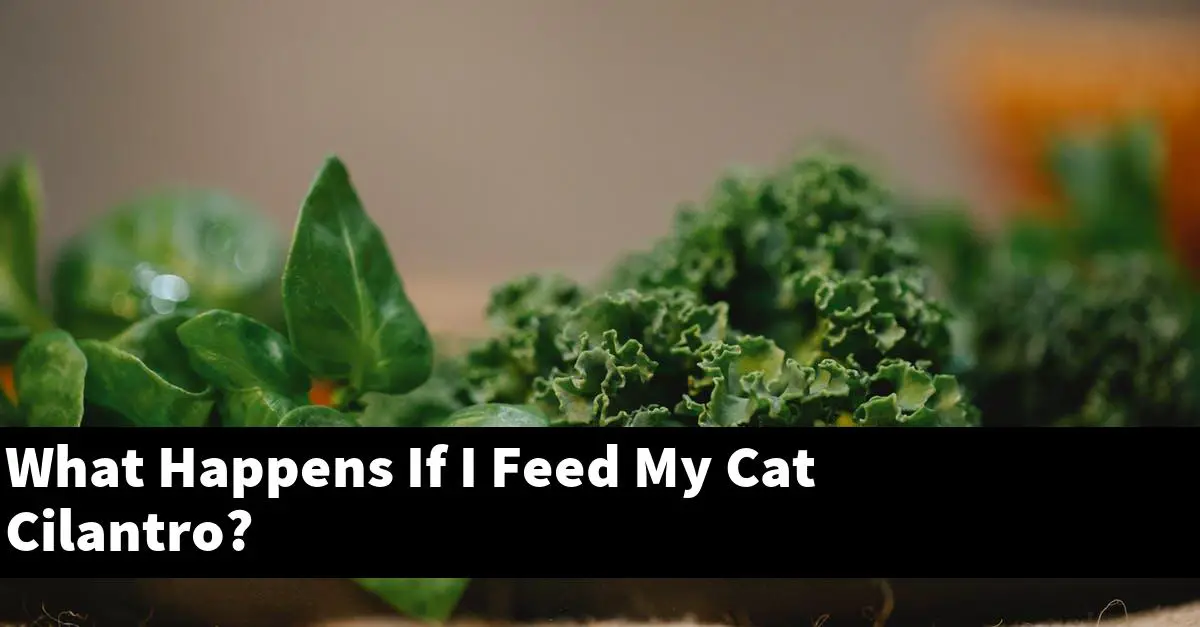Cilantro is a popular herb that is often used in cooking. It has a strong, unique flavor that some people love and others find to be unpleasant.
While cilantro is safe for most people, there are some potential risks to consider before feeding it to your cat. Cats are known to be particularly sensitive to certain compounds in plants, and cilantro contains a compound called furanocoumarin.
This compound can cause gastrointestinal upset in some cats, including vomiting and diarrhea. If you’re considering feeding your cat cilantro, it’s best to talk to your veterinarian first to make sure it’s safe for your pet.
Is cilantro plant toxic to pets?
It is dependent on the particular pet and the cilantro plant. Some pets may be able to safely eat cilantro while others may be allergic to it.
If you are unsure whether or not your pet can safely eat cilantro, you should consult with a veterinarian or a pet healthcare professional.
Is coriander safe for cats?
Coriander is generally safe for cats, but like all plants and herbs, there is always the potential for some potential side effects. Some of the most common side effects include: diarrhea, vomiting, and an upset stomach.
If your cat experiences any of these side effects, stop giving them coriander and consult with a veterinarian.
What happens if a cat eats grass?
In cats, ingestion of small quantities of grass can result in a temporary nutritional deficiency. Grass is a good source of dietary fiber and other nutrients, but can also contain toxins.
In cats, the grass may not be completely digested, which can lead to the development of grass allergies. Signs of grass allergies in cats include: sneezing, watery eyes, itching, and a rash.
If grass ingestion is chronic or significant, it can result in anemia, liver disease, and pancreatitis.
Can cats eat cilantro is it safe?
Cilantro is a member of the parsley family and can be ingested by cats if they are given small amounts as a treat. Cilantro is generally safe to eat for cats, but like all plant-based foods, it should only be given in moderation as some plant-based ingredients can contain small amounts of toxins.
Can cats eat parsley?
Yes, cats can eat parsley. Parsley is a good source of vitamins A and C, and a good source of antioxidants.
Can cats eat onions?
Onions can be a part of a cat’s diet, but it is important to be cautious about how much they eat. If a cat eats too much onion, it can cause stomach upset, vomiting, and diarrhea.
If a cat eats onions regularly, it may develop an allergy to them.
Can cats eat mint?
Different cats may have different tolerances for certain flavors or ingredients. Some cats may enjoy the flavor of mint, while others may not.
Some cats may have no problem eating mint, while others may experience gastrointestinal issues if they eat too much mint. If you are unsure if your cat will be able to eat mint, it is best to consult with a veterinarian.
Can cilantro cause upset stomach?
Everyone’s individual digestive system is different. However, some people may experience upset stomach after eating cilantro because the herb contains compounds that can irritate the stomach.
In addition, some people may be sensitive to the compounds in cilantro that are thought to contribute to the stomach upset. If you are concerned that cilantro may be causing your stomach upset, speak to your healthcare provider about whether or not you should avoid eating the herb.
Can cats eat garlic?
Garlic is not generally accepted as a food for cats. Some veterinarians do not recommend feeding garlic to cats because it can cause stomach upset and even gastrointestinal blockages.
Garlic can also increase the risk of infection in cats.
Can cats eat lime?
Lime is a fruit, so cats can eat it. However, cats may not enjoy the taste of lime.
What does cilantro do to cats?
Cilantro (Coriandrum sativum) is a herbaceous perennial plant in the family Lamiaceae. The leaves and stems of cilantro are highly aromatic and have a strong, pungent flavor that some people find unpleasant in small quantities, but others find refreshing.
The plant is thought to be a deterrent to some pests and parasites, including fleas, ticks, and mosquitoes.
Can cats eat rice?
Rice is a popular grain that can be consumed by cats. Many pet cats enjoy eating rice, as it is a simple and easy food to digest.
Rice is a good source of carbohydrates and fiber, which can provide energy for cats. Additionally, rice provides important nutrients, including thiamine, niacin, and vitamin B6.
What is eating my cilantro leaves?
There are a few potential causes of cilantro leaves eating, but the most common culprit is a rodent. Rodents are attracted to the succulent leaves and can nibble on them until they are gone, leaving small holes in the leaves.
Another cause is a petcat, which may be eating the leaves as a snack.
Is cilantro toxic to cat?
Cilantro is a potential toxic plant for cats. Cats may experience adverse effects if they consume large amounts of cilantro.
Some of the possible effects of cilantro toxicity in cats include vomiting, diarrhea, and an increase in heart rate and body temperature. If your cat has consumed cilantro, please contact your veterinarian for advice.
Final Thoughts
If you feed your cat cilantro, it may experience digestive issues, as the plant is not typically part of a cat’s diet. Cilantro can cause an upset stomach, vomiting, and diarrhea in cats.
If your cat ingests a large amount of cilantro, it may also experience liver damage. Therefore, it is best to avoid feeding your cat cilantro.

